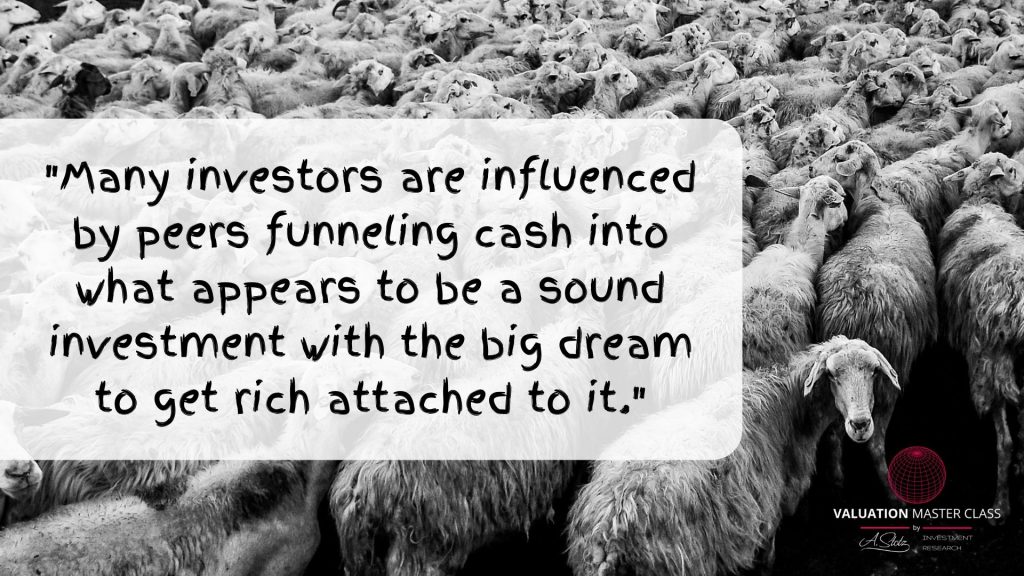VMC: Treating Stocks as Business Ownership Is Contrarian Today
This is a Valuation Master Class student essay by Erick A. Rubin from May 6, 2019. Erick wrote this essay in Module 4 and has since completed all five modules of the Valuation Master Class. The post was originally published here.
When it comes to money and investing decisions, we are not always as rational as we think we are; therefore, in this essay, I will expand about investors’ behavior in the stock market.
“Only buy something that you’d be perfectly happy to hold if the market shut down for 10 years.” – Warren Buffett
From the famous quote of the legendary investor Warren Buffett, we learn that having the business-owner mindset is essential for investing.
What is herd mentality?
Herd mentality is the habit of people to mimic the actions of others in a large group. Herd mentality branches from copying the actions of people of high status, but often, herd behavior is the result of going with the crowd.
Herd mentality in the stock market
In the stock market, herd mentality can result in bubbles. Two recent bubbles are the Bitcoin cryptocurrency booming in late 2017 and the Global Financial Crisis of 2008. Investment decisions are often fueled as much by emotion as logic, if not more so. Many investors are influenced by peers funneling cash into what appears to be a sound investment with the big dream to get rich attached to it. Few investors take the time and effort to do their research.
When it comes to investing, you should do proper research and follow the path of logic and facts, not the way of media hype and enthusiasm from peers.
Why many fail in investing
Many investors are conditioned to track a particular benchmark. Analysts are consistently following the financial news because of underlying human fear, the fear of standing out from the herd. Two essential skills that can help you succeed in investing:
- Knowledge and practice of the techniques to analyze stocks and estimate the intrinsic value.
- The mental strength to stick to your discipline even when the market and the media screams you are wrong.
Learning the valuation techniques is the easy part. Discipline is hard; it involves a strong belief in the process. When you pick a stock based on a contrarian view, you often stand alone. It takes courage to stick to your convictions.
The business-owner mindset for investors
Having a business-owner mindset in stock investing is crucial. An investor needs to be able to separate themselves from what everyone else is doing and insulate themselves from their emotional swings.
The main idea of a business-owner mindset is developing a mindset equivalent to someone who runs and owns their own business. Imagine that you are the CEO and majority shareholder of the company; you would have so much attention and care of the business.
This whole concept of the business-owner mindset starts with Benjamin Graham, who lays down the founding principle of value investing and suggests that investors are buying companies, not pieces of papers (shares). In other words, you should have the mindset of “Is this a company I would be happy to run and own myself.”
Another point to make about a business owner mindset is the long-term outlook. If you examined the company properly and you understand the true value of the company you are immune to short-term financial market fluctuations
Treat a share investment as business ownership
Treating a share, for what it is, ownership in a business and valuing it accordingly is part and parcel of being a good value investor. Acting with a business-owner mindset requires to put yourself at the head of the business and evaluate the company and its business practice from there.
References
Join the Bootcamp for Valuation!
The Valuation Master Class is the complete, proven, step-by-step course to guide you from novice to valuation expert.
Save US$50 with coupon code: get-smarter
Click here to learn more and register.
DISCLAIMER: This content is for information purposes only. It is not intended to be investment advice. Readers should not consider statements made by the author(s) as formal recommendations and should consult their financial advisor before making any investment decisions. While the information provided is believed to be accurate, it may include errors or inaccuracies. The author(s) cannot be held liable for any actions taken as a result of reading this article.

